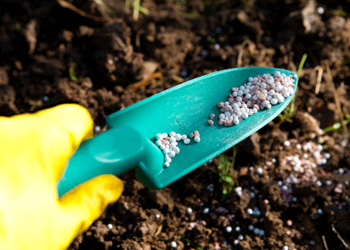
Why Plants Need Fertilizer
All the nutrients essential for plant growth are present in the soil or the air, so why do plants need fertilizer? The thing is, not all plants can access these key nutrients. Each soil has its own mix of nutritional ingredients. Intensive farming, construction, and traffic can alter soil chemistry and structure, limiting the amount of nutrients a plant can use. Additionally, some nutrients are not there to begin with or have been taken out over time. Gardeners must replenish, and replace these nutrients if they want truly healthy plants.
Key Elements in Fertilizer
N = Nitrogen promotes healthy leaf growth by stimulating the production of chlorophyll (the main chemical involved in photosynthesis—how plants convert sunlight into food).
P = Phosphorus supports the vigorous development of roots, stems, blossoms, and fruits.
K = Potassium plays a key role in helping plants digest and manufactures their foods.
The essential elements that all plants need are nitrogen, phosphorus, and potassium, N-P-K. The proportions are placed on the package in terms of percentages. A 20-20-20 would have 20% of each element with the remaining 40% composed of inert materials and trace elements. Many fertilizers are formulated for specific plants like roses, bulbs, or vegetables. However, there are some general percentages that you can note.
Boosted Flower Production: 15-30-15
Greener Lawn: 25-6-4
When to Fertilize
Your garden may benefit from one to two applications of a balanced fertilizer in early spring and again in early summer. Most perennials, annuals, and lawns will benefit from a balanced fertilizer in early spring. Trees and shrubs should be fertilized once in the spring and again in the fall. Late fall is also a good time to fertilize bulbs, especially if they are being planted for the first time. Roses should be fertilized every seven days during their blooming season to be kept fat and happy. In general, only fertilize established plants. Fertilizing seeds can cause fertilizer burn. Also, avoid fertilizing before spring showers. The nutrients will be leached out of the soil.
Overfertilizing
When it comes to fertilizing, more does not mean better. Overfertilizing can harm plants, while the right amount of fertilizer can encourage the growth of healthy plants and blooms in your flower garden. When you over fertilize, salt builds up on the soil and causes a drying effect. This can cause your grass to turn yellow or brown in a process called fertilizer burn.